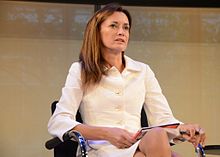Blythe Masters
| Blythe Masters | |
|---|---|

Blythe Masters speaking in 2015
|
|
| Born |
Blythe Sally Jess Levett 22 March 1969 Oxford, United Kingdom |
| Education | The King's School, Canterbury |
| Alma mater | Trinity College, Cambridge |
| Occupation | CEO Digital Asset Holdings, LLC Former executive at J.P. Morgan |
| Known for | Entrepreneur in financial services |
| Relatives | Gordon Levett (father) |
Blythe Masters (born 22 March 1969) is an economist and former executive at JPMorgan Chase. She is currently the CEO of Digital Asset Holdings, a financial technology firm developing distributed ledger technology for wholesale financial services. Masters is widely credited as the creator of the credit default swap as a financial instrument. She is also Chairman of the Governing Board of the Linux Foundation’s open source Hyperledger Project, member of the International Advisory Board of Santander Group, and Advisory Board Member of the US Chamber of Digital Commerce.
Born in Oxford, Masters was raised in the south-east of England. She attended The King's School in Canterbury. She graduated in 1991 from Trinity College, Cambridge with a B.A. in economics.
Masters joined the bank JP Morgan Chase in 1991 after completing a number of internships there while still a student dating back to 1987. Responsible for credit derivative products at J.P. Morgan, Masters became a managing director at 28, the youngest woman to achieve that status in the firm's history. She is widely credited with creating the modern credit default swap, a derivative used to manage credit exposure to underlying reference entities. In 1994, J.P. Morgan had extended a $4.8 billion credit line to Exxon, which faced the threat of $5 billion in punitive damages for the Exxon Valdez oil spill. A team of J.P. Morgan bankers led by Masters then purchased credit protection against the credit line to the European Bank of Reconstruction and Development to cut the capital which J.P. Morgan was required to hold against Exxon's default, thus reducing its own risk. J.P. Morgan later bundled together packages of such exposures and offered them to market as BISTRO, for Broad Index Secured Trust Offering, and these new financial instruments were quickly adopted by other banking institutions.
...
Wikipedia
